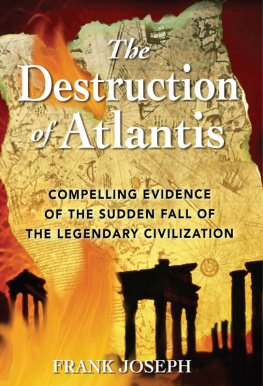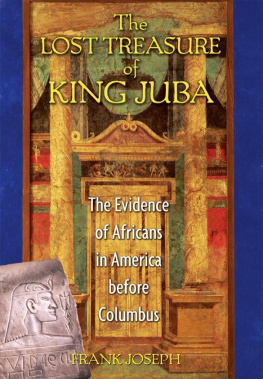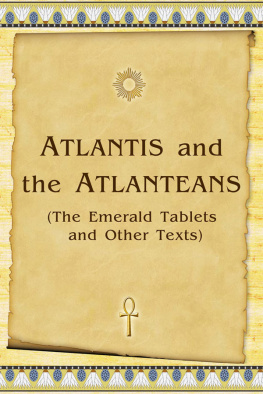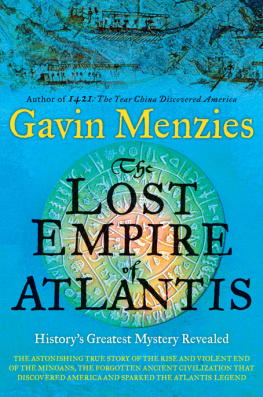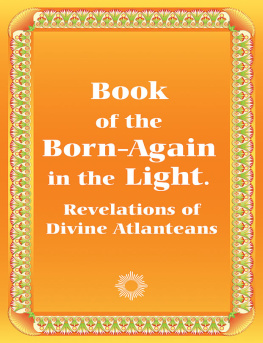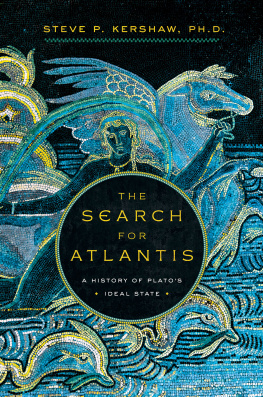
To N. Thomas Miller, in whose art the spirit of Atlantis lives
INTRODUCTION
A MILLION TONS OF COPPER
There have been and will be many different calamities to destroy mankind, the greatest of them by fire and water.
PLATO, TIMAEUS
A tlantis. No name is so evocative for millions of people around the world after thousands of years. It has lent its identity to a space shuttle and is featured in major motion pictures and television programs. It figures into the titles of more new books published about the sunken realm than ever before, adding to an estimated 2,500 volumes and magazine articles already in print on the subject. Mere allusion to it among conventional scholars is enough to elicit their emphatic condemnation of any mythomaniac who suggests some basis in fact for the lost city. But despite more than one hundred years of official opposition, popular fascination with Atlantis, as well as intense interest on the part of an international circle of mostly independent researchers, demonstrates the durability of general belief that it was once a reality. At the beginning of the twenty-first century that circle has grown to an unprecedented magnitude as an accumulating body of hard scientific evidence is rapidly transforming theory into fact.
For all the fame of Atlantis, most people know very little about it. They presume it was an oceanic kingdom that long ago dominated much of the globe before a natural catastrophe sank it beneath the sea, followed by the escape of some survivors to various parts of the planet. Many Atlantologists believe civilization first arose on the continent of Atlantis at least a dozen millennia ago and was destroyed around 9500 B.C.E. by a great flood. Both skeptics and true believers, however, are in danger of being outdated by this book. It is not a rehash of my earlier investigation, The Destruction of Atlantis, but a presentation of entirely new material on the same subject. The Atlantean war, four global cataclysms, and the fate of survivors in various parts of the world are described here for the first time.
Survivors of Atlantis takes its cue from a conference of leading scientific authorities that met in Cambridge, England. During the summer of 1997 experts in a variety of academic disciplines, from geology and astrophysics to archaeoastronomy and oceanography, combined their independent findings to paint a picture of the past radically different from the familiar image taught by generations of mainstream educators. The new evidence they presented was as startling as it was convincing. They demonstrated that close passes made by a series of several comets inflicted four different cataclysms on our planet during the first epoch of human history. These celestial events and the disasters they generated are not merely the conjectures of theorists. A wealth of material proof confirms that the worldwide calamities did indeed take place, and that the last one pushed civilization to the brink of extinction.
Studying dozens of presentations from the Cambridge conference, I was forcibly reminded that numerous cultures around the world remembered four major floods followed by mass migrations. This tradition was shared by such diverse peoples as the Incas of Peru, the Celtic Irish, the classical Greeks, the Aztecs of Mexico, and many others. Moreover, there is a close fit between their folk memories and what science now recognizes as a quartet of natural catastrophes that ravaged the earth beginning more than five thousand years ago. But when the evidence of physical archaeology is added to myth, astronomy, and geology, a new light on the ancient past suddenly winks on. Its brightness has illuminated the hitherto unseen causes that brought history into existence. Clearly exposed is a common theme that over and over again threads together and makes sense of all the diverse twists and turns in a vast human drama: Atlantis. The name is as inescapable as it is powerfully revealing.
Connecting that sunken realm to four separate global calamities that we now know occurred explains the beginning and development of civilization, while simultaneously defining Atlantis within the credible parameters of real history, not speculative fantasy. It suffered not one but several different catastrophes, each one separated by many centuries, until a fourth destruction finally obliterated the kingdom. Survivors of Atlantis describes these individual events for the first time, elucidating them via traditions from Egypt, Mesopotamia, Morocco, the Canary Islands, Ireland, Wales, Scandinavia, pre-Columbian North America, Mesoamerica, and preconquest South America. Many of their Atlantean flood myths about the sunken realm have never before been made available to a general audience, but are presented here to humanize the scientific evidence. After all, the men and women of preclassical times were eyewitnesses to cataclysms that repeatedly devastated their world, disasters they chronicled in an imperishable medium. Papyri burn; words carved in stone erode; clay tablets crumble. But a vitally important message wrapped in myth endures over time like the body of an insect preserved in amber.
Survivors of Atlantis relates another story that has not yet been told, that of the war Plato said the Atlanteans launched in a bold bid to conquer the world. Their military adventure, previously neglected by historians, was intimately connected with and actually determined by the natural calamities that eventually overwhelmed them. The chaos humankind brought about on Earth was mirrored in the angry heavens. In this regard Survivors of Atlantis is a companion volume to my first investigation of the subject, which touched on the war but did not detail it.
The Destruction of Atlantis focused on the last moments of that doomed civilization, because those moments were nearest to us in time and therefore more easily documented. Readers who assumed Atlantis was already many millennia old at the time of its demise around 10,000 B.C.E. were surprised to learn that the city met its ultimate fate just 3,200 years ago. The books purpose, however, was not to discuss Atlantean origins or age, but to explain a final annihilating event in the context of the Bronze Age. With its sudden end around 1200 B.C.E., pre-classical civilization everywhere collapsed or went into irreversible decline, from pharaonic Egypt and Homeric Greece to the Hittite empire and Chinas Shang dynasty. Atlantis was one more victim of the worldwide catastrophe. Like the others, it was an identifiably Bronze Age city, according to Platos description.
His dialogues Timaeus and Critias, composed around 340 B.C.E., contain the earliest surviving narratives of their kind. They portray the Atlanteans as preeminent mariners and metalsmiths who sailed great distances and manufactured orichalcum, an exceptionally high-grade copper that Plato reported was no longer available in his day. Through their export of orichalcum, he said, the Atlanteans became fabulously wealthy and powerful. His characterization of them as prosperous seafaring miners is the piece of evidence connecting two great historical enigmas.
For more than ten thousand years the North American continent was sparsely inhabited by Paleo-Indian tribes of nomadic hunter-gatherers who followed migrating animal herds and possessed little in the way of material culture. In the Upper Great Lakes region they occasionally picked up pieces of float copper left behind by retreating glaciers and then annealed, or cold-hammered, the chunks into trinkets with which to adorn themselves. Then, around 3000 B.C.E., an ambitious mining enterprise opened with great suddenness along the Lake Superior shores of the Michigan Peninsula and on Isle Royale in Lake Superior. Over the next twenty-two centuries, a minimum of half a billion pounds of the worlds highest-grade copper were excavated from five thousand pit mines, some of them sunk sixty feet down through solid rock.
Next page

